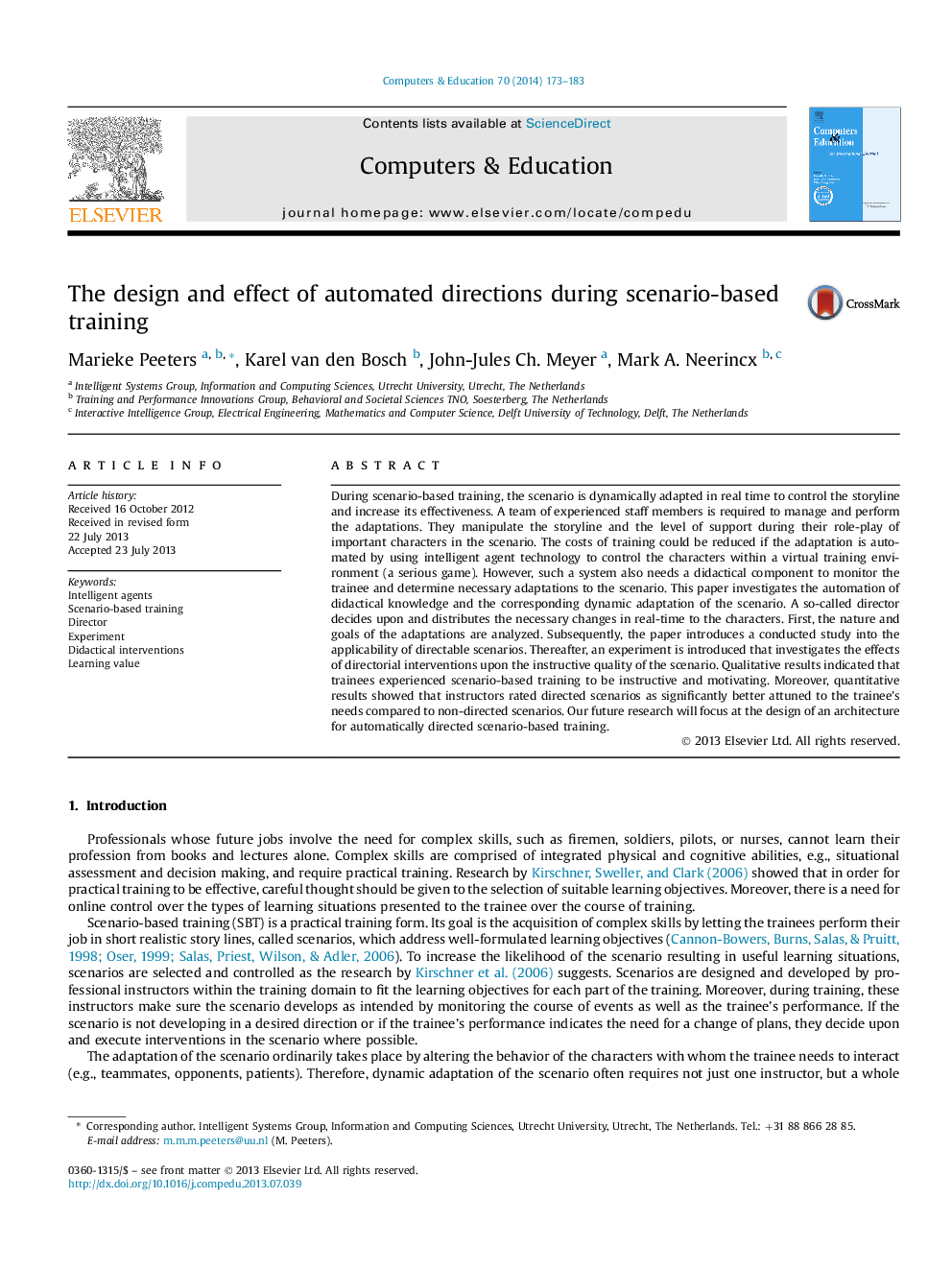| کد مقاله | کد نشریه | سال انتشار | مقاله انگلیسی | نسخه تمام متن |
|---|---|---|---|---|
| 6835384 | 618184 | 2014 | 11 صفحه PDF | دانلود رایگان |
عنوان انگلیسی مقاله ISI
The design and effect of automated directions during scenario-based training
ترجمه فارسی عنوان
طراحی و اثر مسیرهای خودکار در طی آموزش مبتنی بر سناریو
دانلود مقاله + سفارش ترجمه
دانلود مقاله ISI انگلیسی
رایگان برای ایرانیان
کلمات کلیدی
عوامل هوشمند، آموزش مبتنی بر سناریو، کارگردان، آزمایشی مداخلات بزرگ ارزش یادگیری،
ترجمه چکیده
در طی تمرین مبتنی بر سناریو، سناریو به صورت پویا در زمان واقعی سازگار است تا بتواند داستان را کنترل و اثربخشی آن را افزایش دهد. یک تیم از کارکنان با تجربه، نیاز به مدیریت و سازگاری دارد. آنها داستان و سطح حمایت را در طی نقش بازی کردن شخصیت های مهم در سناریو دستکاری می کنند. هزینه های آموزش را می توان کاهش داد در صورتی که سازگاری با استفاده از تکنولوژی عامل هوشمند برای کنترل کاراکترها در یک محیط آموزش مجازی (یک بازی جدی) خودکار شود. با این حال، چنین سیستمی همچنین نیاز به یک جزء آموزشی برای نظارت بر کارآموزی و تعیین سازگاری لازم برای سناریو دارد. این مقاله به بررسی اتوماسیون دانش دانش و سازگاری دینامیکی مربوط به سناریو پرداخته است. یک مدیر به اصطلاح تصمیم می گیرد و تغییرات لازم را در زمان واقعی به شخصیت ها توزیع می کند. اولا، ماهیت و اهداف سازگاری تحلیل می شود. در ادامه مقاله، یک مطالعه انجام شده در مورد کاربرد سناریوهای هدایت شده را معرفی می کند. پس از آن، یک آزمایش ارائه شده است که اثرات مداخلات مداخله را براساس کیفیت آموزنده سناریو بررسی می کند. نتایج کلاسیک نشان داد که کارآموزان آموزش مبتنی بر سناریو را به عنوان آموزنده و انگیزشی تجربه کردند. علاوه بر این، نتایج کمی نشان داد که معلمان سناریوهای هدایت شده را به نحو قابل توجهی بهتر نسبت به نیازهای کارآموزی نسبت به سناریوهای غیر خطی مقایسه می کنند. تحقیقات آینده ما در طراحی یک معماری برای آموزش مبتنی بر سناریو به صورت خودکار هدایت خواهد شد.
موضوعات مرتبط
علوم انسانی و اجتماعی
علوم اجتماعی
آموزش
چکیده انگلیسی
During scenario-based training, the scenario is dynamically adapted in real time to control the storyline and increase its effectiveness. A team of experienced staff members is required to manage and perform the adaptations. They manipulate the storyline and the level of support during their role-play of important characters in the scenario. The costs of training could be reduced if the adaptation is automated by using intelligent agent technology to control the characters within a virtual training environment (a serious game). However, such a system also needs a didactical component to monitor the trainee and determine necessary adaptations to the scenario. This paper investigates the automation of didactical knowledge and the corresponding dynamic adaptation of the scenario. A so-called director decides upon and distributes the necessary changes in real-time to the characters. First, the nature and goals of the adaptations are analyzed. Subsequently, the paper introduces a conducted study into the applicability of directable scenarios. Thereafter, an experiment is introduced that investigates the effects of directorial interventions upon the instructive quality of the scenario. Qualitative results indicated that trainees experienced scenario-based training to be instructive and motivating. Moreover, quantitative results showed that instructors rated directed scenarios as significantly better attuned to the trainee's needs compared to non-directed scenarios. Our future research will focus at the design of an architecture for automatically directed scenario-based training.
ناشر
Database: Elsevier - ScienceDirect (ساینس دایرکت)
Journal: Computers & Education - Volume 70, January 2014, Pages 173-183
Journal: Computers & Education - Volume 70, January 2014, Pages 173-183
نویسندگان
Marieke Peeters, Karel van den Bosch, John-Jules Ch. Meyer, Mark A. Neerincx,
